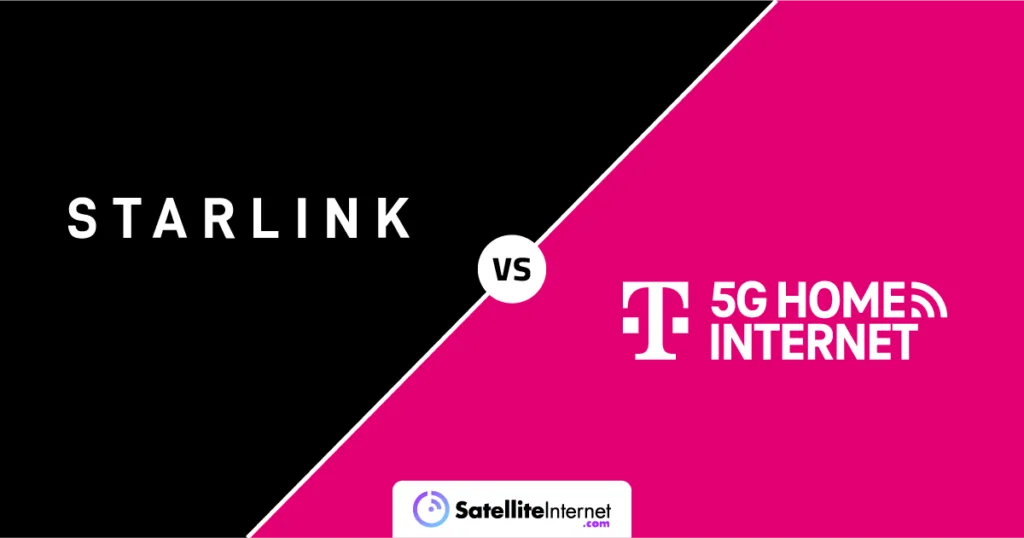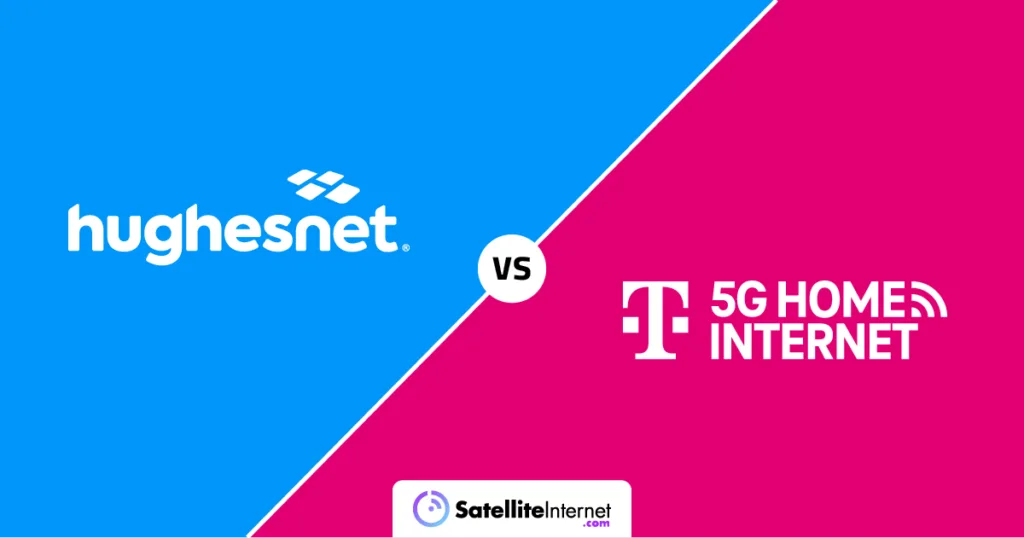I didn’t know what to expect when I set up the T-Mobile 5G gateway at my cabin in rural Utah. Mobile reception has always been finicky amid the forest of aspens and pine trees and Wasatch mountains, so I kept my expectations low. What I found was broadband-level speed that allowed me to do just about everything I could do on my wired home broadband.
T-Mobile 5G Home Internet Review
Its speed, accessibility, and unlimited data might lead you to think it’s a pricey service, but it’s surprisingly affordable.
In this review, I detail my experience with T-Mobile 5G Home Internet and break down its advantages and disadvantages to help you decide if it’s right for you.
How I wrote this T-Mobile 5G Home Internet review
I’m Andreas Rivera, a technology writer with a decade-long career reviewing technology and services. For this T-Mobile 5G Home Internet review, I tested the service under its mid-tier Amplified plan. I conducted the majority of my testing in a rural setting to best compare the service to other rural internet providers, including satellite internet.
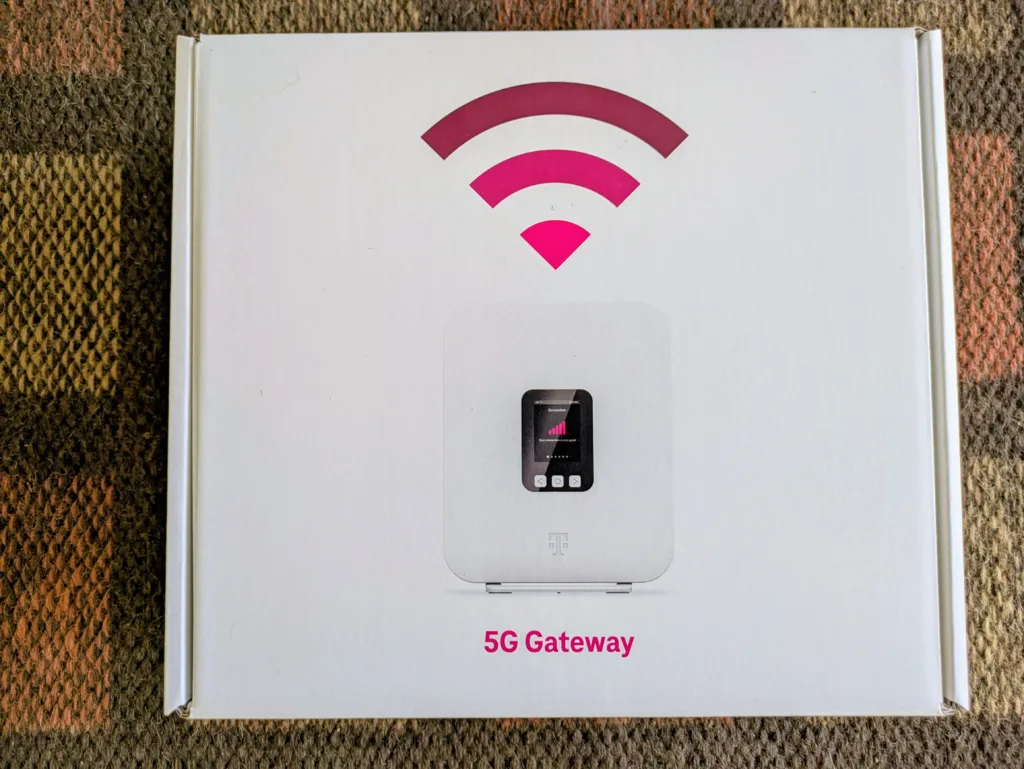
The T-Mobile 5G Gateway (version G4AR) was delivered to my front door in just two business days after signing up. | Photo by Andreas Rivera for SatelliteInternet.com
T-Mobile 5G Home Internet plans and pricing
T-Mobile 5G Home Internet offers three plans, each with distinct features and speeds up to 498Mbps. T-Mobile 5G also encourages customers to bundle their home internet with a mobile plan for more savings. Paired with a qualifying voice line and autopay, customers can save $15 per month on their home internet plan.
Rely Internet
The Rely plan is T-Mobile’s base unlimited plan—and the most affordable when paired with a mobile plan. There aren’t too many bells and whistles. Its download speed is slightly lower than the other two plans, but still decent at up to 318Mbps. However, it comes with a high-performance gateway device—for better Wi-Fi —and, for the higher-tiered plans, several add-ons.
Amplified Internet
Amplified Internet is T-Mobile’s mid-tier plan (the one I tested). It comes with a high-performance premium Wi-Fi 7 Gateway. It also comes with perks, including 24/7 technical support and advanced cybersecurity features for added protection.
All-In Internet
All-In is the top-tier plan and comes with everything in the Amplified plan. Additionally, customers receive a mesh Wi-Fi device to extend coverage to other areas of the house. It’s beneficial for larger homes and multiple users, as the T-Mobile 5G gateway device is best placed near a window rather than in a central part of the home—unlike a traditional Wi-Fi router. Bonuses include subscriptions to Hulu and Paramount+.
T-Mobile 5G Home Internet equipment and installation
All you need for T-Mobile 5G Home Internet is its wireless gateway, which is included with your monthly subscription. It’s an all-in-one antenna, modem, and Wi-Fi router. After signing up online, T-Mobile will ship the device to you within two business days. If you’re extra eager for internet, you can pick one up at a T-Mobile retail location if you live near one.
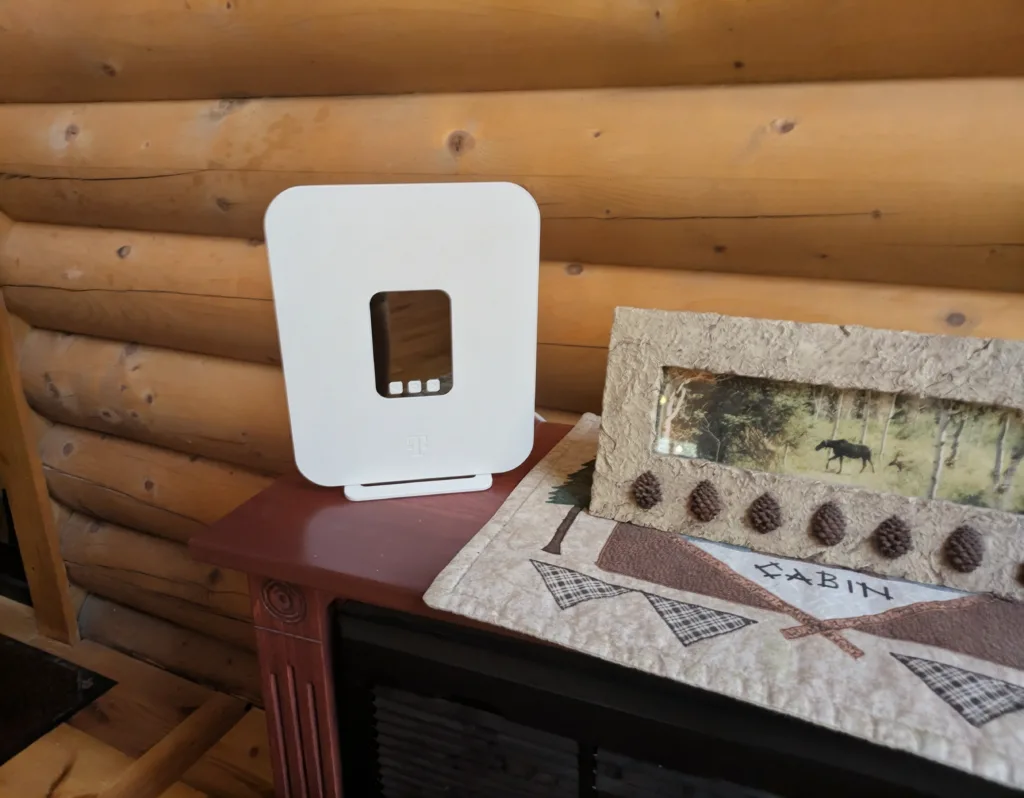
Where I placed the T-Mobile 5G Gateway for the majority of my testing, providing my cabin with high-speed signal. | Photo by Andreas Rivera for SatelliteInternet.com
Installation is as easy as plugging in the device, but placement is a significant factor for performance. T-Mobile, as well as most fixed-wireless providers, recommends placing the gateway/antenna near a window to minimize interference.
I found that the T-Mobile gateway would still receive reception even when not placed near a window. It was able to pick up a strong signal through the log walls of my cabin. You can also purchase external antennas and mesh devices to place near the window or outside while keeping the main router component in a better spot for Wi-Fi.
The final steps for setting up all take place on your phone. I simply needed to log in to my T-Mobile account, scan the QR code displayed on the 5G gateway device’s screen, and follow the instructions to set up my Wi-Fi. It took me a total of five minutes to start browsing.
How we rate and compare rural internet providers
Speed
Takes into account the provider’s download/upload speeds, as well as average latency.
Reliability
Rates the consistency of service and access to customer support.
Data
Rates the allotment of high-speed data in a provider’s plans, taking into account priority data and options for purchasing more data.
Value
Looks at the pricing (including fees, discounts, and special offers) of services for what you’re getting and compared to competitors.
To keep a fair comparison, we rate rural internet providers only against other rural internet competitors.
Our T-Mobile 5G Home Internet provider rating by category
Don’t expect fiber-like speeds. My download speeds peaked at around 150Mbps, which is more than enough for streaming, working from home, taking video calls, and even some light gaming. Downloading large files that are several gigabytes in size isn’t instantaneous, but it took only several minutes. My plan is rated up to 498Mbps, but that kind of speed is likely only achievable closer to the city.

The location surrounding my cabin, miles away from the nearest city. I was able to get a consistent, speedy signal with the T-Mobile 5G Gateway. | Photo by Andreas Rivera for SatelliteInternet.com
I was able to work from home with no problems. I took multiple meetings over Zoom with clear video and audio performance. Any lag was unnoticeable.
My average latency was high, ranging from 40 to 60 ms ping, which is much higher than a wired connection but still significantly better than most satellite providers. I rarely experienced any lag when loading web pages or starting a stream. Complications and slowdowns were more likely to occur when multiple devices were connected.
Reliability
3.8 out of 5
I have been using T-Mobile 5G Home Internet for several weeks, and I have never experienced outages or unexplained slowdowns. The 5G signal remained consistent regardless of where I placed the gateway device. When using the Wi-Fi myself, I never felt the need to upgrade the router or add mesh devices, but it was a different story when I invited others over.
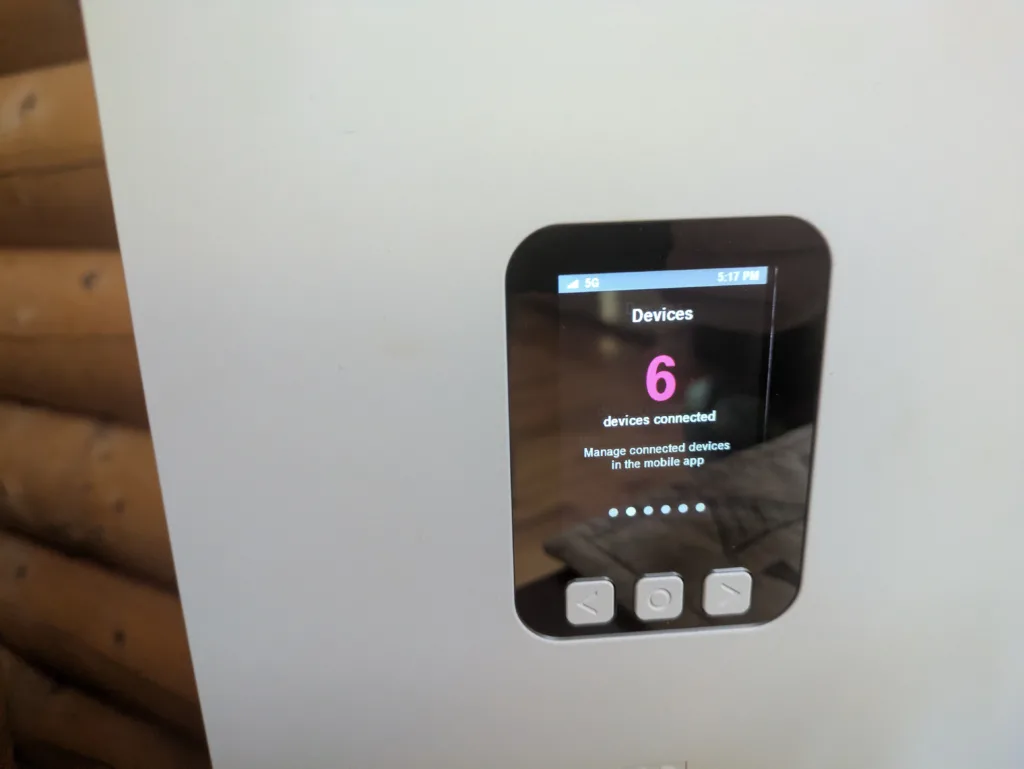
The T-Mobile 5G Gateway device displays useful info like the amount of devices connect to Wi-Fi. | Photo by Andreas Rivera for SatelliteInternet.com
Performance was definitely affected when I had guests over who connected their devices to the Wi-Fi. I stress-tested the gateway by connecting up to seven different devices to the Wi-Fi, including phones, laptops, smart TVs, and gaming consoles. I observed a notable lag on all devices. Streaming apps took longer to buffer, and web pages loaded slightly slower. The speed test on my laptop dipped as low as 22Mbps with all these devices connected. The connection wasn’t unusable, but the effect was definitely noticeable.
Working with T-Mobile customer support was fairly straightforward. I went the non-typical route of switching from a T-Mobile AWAY plan (read my review of T-Mobile’s portable internet service) to a Home Internet version. They were able to help me switch right away, and I could even use the same gateway device. My only big gripe with T-Mobile, and many other providers, is the inability to simply cancel my service online. You’re required to call customer service to cancel. You’re also responsible for returning the equipment via shipping or to an official T-Mobile retail location.
Data
4.0 out of 5
All three of T-Mobile’s Home Internet plans come with unlimited data, making them great for families that are constantly online, love streaming, or work from home. That’s not to say there aren’t limits. Like many providers that offer “unlimited data,” T-Mobile still manages prioritization on its network and may, at its discretion, slow down customers who use unusual amounts of data.
In its terms, T-Mobile deems more than 1.2 terabytes of data as excessive. For regular family use, it’d be rare to hit this in a month. In my case, a long weekend of use, which included some work and entertaining family members, resulted in less than 40GB of data usage. A business internet plan would be a more suitable option for use cases with heavy data usage, such as home businesses with servers that require frequent data uploads.
Value
4.5 out of 5
I recommend starting with the Rely plan to observe the quality of the service at your home. The higher-tiered plans, which cost $10 to $20 more, offer the same quality of service and include hardware upgrades, as well as some valuable yet unnecessary features.
T-Mobile provides a lot of flexibility with its plans, the main differences being the hardware and support availability. With plans starting at $50 per month, it aligns with other wireless home internet plans (and even some wired broadband options). It’s even more budget-friendly when bundled with a T-Mobile voice line, which saves you $15 per month.
Of course, that discount is applicable if you budget in a T-Mobile voice line (if you need both internet and mobile). If you’re in a rural setting, using the Rely plan on its own to meet your communication needs is even more economical.


T-Mobile 5G Home Internet's provider rating overall
I enjoyed my time with T-Mobile 5G Home Internet. Its minimal hardware and straightforward setup make it one of the easiest internet providers to use. The T-Mobile Gateway device is a small box that packs a powerful punch, and it allowed me to work and play at a location where I once thought it’d be impossible to get high-speed internet. Both the speed and reliability were impressive, but I must stress that mileage will vary for users.
T-Mobile 5G is likely to perform its best in populated, urban areas where there’s an abundance of signal. Rural locations will be challenging, since you’re likely far from the nearest cellular signal. Luckily, T-Mobile’s network extends across the vast majority of the U.S. My test site was surrounded by mountains and forest, with the nearest cellular tower miles away—and it worked perfectly.
How do T-Mobile 5G Home Internet's ratings compare to satellite internet competitors?
In rural areas where wired internet providers, such as cable or fiber, are unavailable, satellite internet is a viable alternative to consider. With more extensive coverage than 5G, satellite signals can bring high-speed internet into your home almost anywhere in the United States (and around the world). However, the coverage comes at a cost, both in price and performance. Satellite is known for its high latency, which can make it very laggy and sometimes frustrating to use. T-Mobile’s latency isn’t perfect, but it’s significantly better than that of most satellite providers.
Hughesnet is a satellite internet provider with the lowest priced plans of the main three options. It does come with priority data caps, which may not be ideal for customers who require unlimited high-speed data. Most of its plans also require a two-year contract, unlike T-Mobile and the other satellite providers.
Viasat is more expensive than Hughesnet but requires no contract and offers unlimited data. It still lags behind in performance compared to T-Mobile and Starlink.
Starlink is the fastest-growing satellite internet provider and, by far, the highest-performing. It has the lowest latency of all three, comparable to T-Mobile. It’s also the most expensive, not just with its monthly plans, but also with its requirement to purchase the equipment upfront, which typically costs hundreds of dollars.















